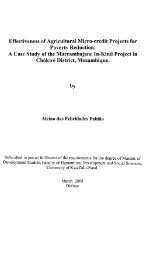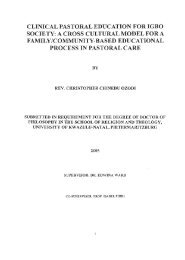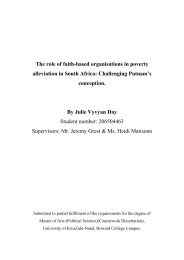View/Open - ResearchSpace - University of KwaZulu-Natal
View/Open - ResearchSpace - University of KwaZulu-Natal
View/Open - ResearchSpace - University of KwaZulu-Natal
You also want an ePaper? Increase the reach of your titles
YUMPU automatically turns print PDFs into web optimized ePapers that Google loves.
2.7 Challenges confronted by volunteer caregivers in HBC for PLWHA<br />
HBC like any other programs have their own challenges. The following discussion is about<br />
the major challenges that volunteer caregivers confront when performing their duties in the<br />
communities.<br />
2.7.1 Lack <strong>of</strong> remuneration causing demoralization to volunteer caregivers<br />
To volunteer means to provide services without expecting to get paid hence the term<br />
volunteer caregivers (Akintola, 2005). Most Home-based care programs in South Africa rely<br />
on volunteer caregivers as the main source <strong>of</strong> labour (Akintola, 2010). These volunteer<br />
caregivers in HBC programs are not paid but they can be given gifts in form <strong>of</strong> stipends as<br />
tokens <strong>of</strong> appreciation for the services that they provide and also to cover their transport costs<br />
(Akintola, 2005). Lack <strong>of</strong> remuneration for volunteer caregivers may cause them to feel<br />
demoralized, frustrated and reluctant in performing their work which may cause the quality <strong>of</strong><br />
care given to the clients to be compromised. This can also deteriorate the health <strong>of</strong> the<br />
patients (Shaibu, 2006). For example, in a study conducted in one <strong>of</strong> the villages in<br />
Botswana on the process <strong>of</strong> establishing community home-based care and challenges faced<br />
by <strong>University</strong> staff, students and volunteers caregivers, the findings showed that some<br />
volunteer caregivers were provided with transport money by their district <strong>of</strong>fices while others<br />
were not due to lack <strong>of</strong> adequate funding. Those that were not paid became discouraged and<br />
reluctant to continue with their work (Shaibu, 2006).<br />
On the other hand, when volunteer caregivers are given a few incentives they are able to do<br />
their work more effectively. In Zambia, for example, a study was conducted on HBC by<br />
SAFAID & HDN (2007) and findings revealed that volunteer caregivers were not paid but<br />
they were given free access to medical facilities and to community ploughs, they received<br />
seeds, uniforms, bicycles, t-shirts and they were allowed to conduct income generating<br />
projects such as gardening to meet their needs. These incentives increased their willingness to<br />
perform their care giving duties and were more productive.<br />
15
















